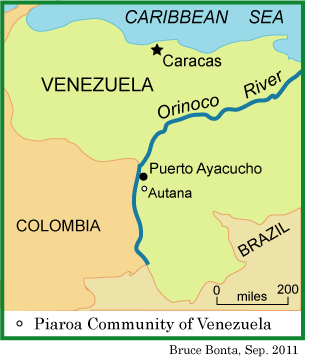Carlos Morales Peña, assistant coordinator of OIPUS, is frustrated. The leader of the Piaroa organization has been trying for three years to get the government of Venezuela’s Amazonas state to respond to its requests for the demarcation of their lands in Autana municipality. The government does not answer.
 Last week he told El Nacional, a major Venezuelan daily newspaper, that he, plus other indigenous representatives, went into the state Ministry of Environment on May 22, 2008, to file the proper papers. He says that they followed the requirements as set forth in the Organic Law of Indigenous Peoples and Communities. They delivered all the proper documents to the ministry in Puerto Ayacucho, the state capital.
Last week he told El Nacional, a major Venezuelan daily newspaper, that he, plus other indigenous representatives, went into the state Ministry of Environment on May 22, 2008, to file the proper papers. He says that they followed the requirements as set forth in the Organic Law of Indigenous Peoples and Communities. They delivered all the proper documents to the ministry in Puerto Ayacucho, the state capital.
At the time, he was told that the agency had a lack of resources to handle the request. He felt that the petition had been denied, but he wasn’t sure. On October 10, 2010, he held a meeting with Elias Jaua, Vice President of Venezuela. He gave the vice president some additional documents to buttress his case. So far, no response.
Autana is one of seven municipalities that constitute Amazonas State. Mr. Morales told the press that the national constitution establishes the right of indigenous communities to demarcate their lands, a right that is confirmed by the International Labor Organization. He urges a definitive answer from the government, and suggests that he might request an urgent audience with President Chávez to help resolve the issue.
Stanford Zent, in a helpful article published in 2009, explains that OIPUS, or the Organizaciones Indígenas Pueblo Uwottuja del Sisapo, is a political association that tries to represent the interests of the Piaroa in the Sisapo region of the state. It, and another comparable regional association, effectively replaced an earlier all-Piaroa parliament that had tried, but failed, to represent all of the Piaroa people.
Zent indicates that the Piaroa have since formed other, macro-scale indigenous federations, plus local, community-based, associations. All of these organizations, however, complicate the ability of the Piaroa to accomplish much within the complexities of their state politics.